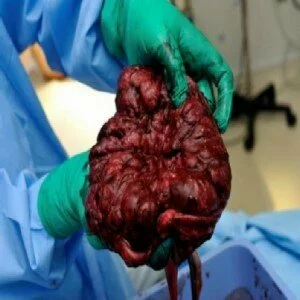There is no scientific evidence that eating the placenta after childbirth can protect women against depression and boost energy, US research suggests.
Claims that the placenta contains vitamins which could benefit a woman’s health have increased interest in the practice in recent years.
But a review by Northwestern University found no proven benefits and no research on the potential risks.
The Royal College of Midwives said it should be the woman’s choice.
The researchers said the popularity of eating placentas had risen in the last few years but this may have been due to women being influenced by media reports, blogs and websites.
Their review, published in Archives of Women’s Mental Health, looked at 10 published studies related to placenta eating.
Women should be aware that like any foodstuff, placentas can go offLouise Silverton, Royal College of Midwives
But it could not find any data to support the claims that eating the placenta raw, cooked or in pill form carried any health benefits.
Placentophagy, as the act of eating placentas is known, has been said to reduce pain after delivery, increase energy levels, help with breastmilk production and enhance bonding between mother and child.
Some are also convinced that it replenishes iron stores in the body, but the research team said this was based on subjective reports rather than scientific research.
The review also said there were no studies which looked at the risks of eating the placenta.
The organ acts as a filter to absorb and protect the developing foetus from toxins and pollutants.







No Comments